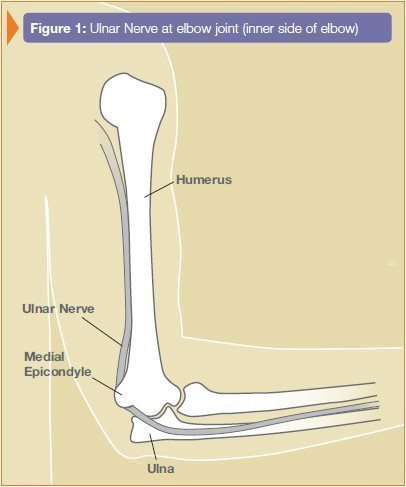 What many people call the “funny bone” really is a nerve. This ulnar nerve runs behind a bone in the elbow through a space called the “cubital tunnel” (Figure 1). Although “banging the funny bone” usually causes temporary symptoms, chronic pressure on or stretching of the nerve can affect the blood supply to the ulnar nerve, causing numbness or tingling in the ring and small fingers, pain in the forearm, and/or weakness in the hand. This is called “cubital tunnel syndrome.”
What many people call the “funny bone” really is a nerve. This ulnar nerve runs behind a bone in the elbow through a space called the “cubital tunnel” (Figure 1). Although “banging the funny bone” usually causes temporary symptoms, chronic pressure on or stretching of the nerve can affect the blood supply to the ulnar nerve, causing numbness or tingling in the ring and small fingers, pain in the forearm, and/or weakness in the hand. This is called “cubital tunnel syndrome.”
Causes
There are a few causes of this ulnar nerve problem. These include:
Pressure. Because the nerve runs through that “funny bone” groove and has little padding over it, direct pressure (like leaning your arm on an arm rest) can compress the nerve, causing your arm and hand—especially the ring and small fingers—to “fall asleep.”
Stretch. Keeping the elbow bent for a long time can stretch the nerve behind the elbow. This usually happens during sleep.
Anatomy. Sometimes, the ulnar nerve does not stay in its place and snaps back and forth over a bony bump as the elbow is moved. Repetitive snapping can irritate the nerve. Sometimes, the soft tissues over the nerve become thicker or there is an “extra” muscle over the nerve that can keep the nerve from working correctly.
Signs and Symptoms
Cubital tunnel syndrome can cause pain, loss of sensation, and/or tingling. “Pins and needles” usually are felt in the ring and small fingers. These symptoms are often felt when the elbow is kept bent for a long time, such as while holding a phone or while sleeping. Some people feel weak or clumsy. Loss of sensation and loss of strength or muscle in the hand is serious.
Diagnosis
Your doctor will be able to tell a lot by asking you about your symptoms and examining you. S/he might test you for other medical problems like diabetes or thyroid disease. A test called electromyography (EMG) and/or nerve conduction study (NCS) might be needed to see how much the nerve and muscle are being affected. This test also checks for other problems like a pinched nerve in the neck, which can cause similar symptoms.
Treatment
The first treatment is to avoid actions that cause symptoms. Wrapping a pillow or towel around the elbow or wearing a splint at night to keep the elbow from bending during sleep can help. Avoiding leaning on the “funny bone” part of the elbow can help also. A hand therapist can help you learn ways to avoid pressure on the nerve. When symptoms are severe or not getting better, surgery may be needed to relieve the pressure on the nerve.
This can involve releasing the nerve, moving the nerve to the front of the elbow, and/or removing a part of the bone. Your surgeon will talk to you about what is the right option for you and guide your care. Therapy sometimes is needed after surgery, and the time it takes to recover varies. Numbness and tingling may improve quickly or slowly, and it may take many months for the strength in your hand to improve. Cubital tunnel symptoms may not totally go away after surgery, especially if symptoms are severe.












